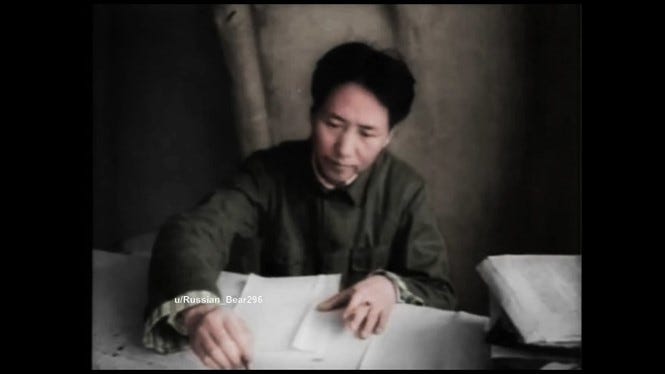At Peitaiho
[a tsu, to the melody Wave-washed Sands, Lang Tao Sha]
[translated by Nancy Lin]
What a downpour on the Old North,
White breakers licking the skies!
No fishing boats off Emperor’s Isle
Now remain in sight.
Over this expanse of flooding fury,
Where could they be?
Events traceable over a millennium ago:
Martial Tsao Tsao wielded his staff here.
“Eastward to Monument Rock” –
So testifies his ode to this day.
“The autumn wind whistles” as ever.
The world of men has changed!
Notes [by Nancy Lin]
Old North: means here Hopei Province, referred to in the poem as Yuyen, a classic name for the same region.
Tsao Tsao: Emperor Wu of the Wei Kingdom (155-220 A.D.) and statesman-poet. He led an expedition against the Wuhuan tartars in the north in 207 A.D. On passing Monument Rock (Chiehshih), a promontory south of Peitaiho but sunk into the sea since the fifth century, he wrote his famed ode, Visit to the East Sea, containing the lines ‘Eastward to Monument Rock’ and ‘The autumn wind whistles’ as quoted in Mao’s poem.
Peitaiho: a well-known seaside resort on the Gulf of Pohai, close to Chinhuang Tao (Emperor’s Isle), an ancient fishing port in east Hopei Province.
Here in February 1954, the CPC held the fourth session of its Seventh Central Political Committee, and People’s China had every reason to be proud of its achievements: the completion of the Land Reform that wiped out the basis of feudal economy and the proclamation of the General Line Program that set the nation forth to ‘building socialism’.
The year 1953 was one of especial significance: the conclusion of the Korean War, the inauguration of the First Five-year Plan and the all-out drive for agricultural co-operatives throughout the country.
This poem was written in 1954, while the poet was summering at Peitaiho. No doubt he had in his mind’s eye the changed look China was assuming. Characteristically, however, he starts with dashes of nature – the rain, the waves, the fishing boats and the fragmentary wanderings of an impressionist artist. With the second stanza, he roams leisurely into the remote realm of history and lights upon an episode pertinent to the locality – the emperor-warrior and his campaign and the legacy that was his ode.
Apparently Mao’s thoughts are a thousand years away. Yet deftly enough, he makes use of a bit of nature, of nature-in-history – ‘the autumn wind’ in the said ode, and with a whirling turn plants us solidly in front of the present in four bold characters huan liao jen-chien [the world of men has changed].China has changed, and with it the world! The astonishing potency – effortlessly chieved – of the laconic finale is one of the masterly strokes the poet has executed. And within a matter of a month or so, he opened the First People’s Congress in Peking with the historic announcement:
“We are prosecuting a most glorious and stupendous cause unprecedented in history. Our objectives shall be achieved, and they can be achieved!”
[next - 23. Swimming]



